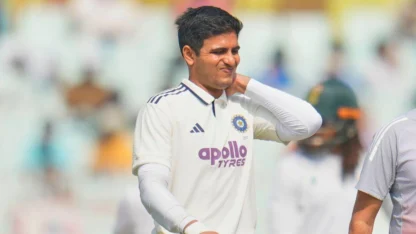India have registered a unique record by defeating South Africa in the Shortest Test match played in Test history in Cape Town. The IND vs SA 2nd Test ended with India winning in just 642 balls on Thursday. Let us look at the list of shortest Test matches with respect to balls being bowled.
India was given a low total of 79 by Proteas which they achieved within 12 overs. They won the match by seven wickets on Day 2.
With this, India broke a record 92-year-old record when Australia won the shortest Test match by balls bowled against the Proteas in 1932 with 656 balls.
Shortest Test Match by balls bowled
| Team 1 | Team 2 | Balls | Overs | Winner | Ground | Match Date |
| South Africa | India | 642 | 107 | India | Cape Town | 3 Jan 2024 |
| Australia | South Africa | 656 | 109.2 | Australia | Melbourne | 12 Feb 1932 |
| West Indies | England | 672 | 112 | England | Bridgetown | 8 Jan 1935 |
| England | Australia | 788 | 197.0×4 | England | Manchester | 30 Aug 1888 |
| England | Australia | 792 | 198.0×4 | Australia | Lord’s | 16 Jul 1888 |
| South Africa | England | 796 | 199.0×4 | England | Cape Town | 25 Mar 1889 |
| England | South Africa | 815 | 135.5 | England | The Oval | 12 Aug 1912 |
| India | England | 842 | 140.2 | India | Ahmedabad | 24 Feb 2021 |
| Australia | South Africa | 866 | 144.2 | Australia | Brisbane | 17 Dec 2022 |
| New Zealand | Australia | 872 | 145.2 | Australia | Wellington | 29 Mar 1946 |
5 Shortest Test match in cricket history
India vs South Africa – 107 overs, 2024
India and South Africa’s match at Netlands in Cape Town was the shortest Test match in history. This test, the first of 2024, was completed in a mere five sessions. After batting first, South Africa was bowled out for the lowest amount of runs at home 55 runs in 23.2 overs. After appearing strong at first, India lost the final six wickets without scoring any runs with 153 runs on the board. Proteas bundled out 176 runs in 36.5 overs. India was given 79 runs target, which they successfully chased in 12 overs.
Australia vs South Africa – 109.2 overs, 1935
Before this match, Australia and South Africa played the shortest test match ever at the MCG. Australia scored 153 runs in 54.3 overs when they batted once. In response, South Africa’s two innings saw them bowled out for 36 runs (23.2 overs) and 45 runs (31.3 overs). Australia prevailed in that match, which lasted 109.2 overs, by an innings and 72 runs.
West Indies vs England -112 overs, 1935
In January 1935, the West Indies and England played the third-shortest game in Bridgetown. There were only 112 overs in this game. West Indies scored 102 runs in 47 overs. Due to the unruly pitch, England responded by declaring their innings at 81/7 in 29.3 overs. West Indies declared at 51/6 after 19 overs in second innings. In the fourth innings, England scored 75/6 in 16.3 overs and won the match.
England vs Australia -196 overs, 1888
The fourth shortest test match took place at Old Trafford during the 1888 Ashes series. At that time, England Test matches were played under the unusual regulation of 4 balls every over. The match lasted only 196 overs (1176 balls). In their two innings (81 and 70), Australia could only muster a total of 151, while England scored a commanding 172. With this lopsided display, England won by an innings and twenty-one runs.
England vs Australia -197 overs, 1888
During the same series, the legendary Lord’s hosted the shortest Test match ever, with just 197 overs, on its sacred field. (1,882 balls). After Australia batted first and scored 116 runs in 71.2 overs, England could only manage 53 runs in 50 overs. After Australia was dismissed for 60 in 29.2 overs during their second innings, England was dismissed for 62 in 47 overs.
Editor's Pick
 Cricket
Shubman Gill suffers another injury, ruled out of IND vs SA 4th T20I & uncertain for Ahmedabad
Cricket
Shubman Gill suffers another injury, ruled out of IND vs SA 4th T20I & uncertain for Ahmedabad


















































